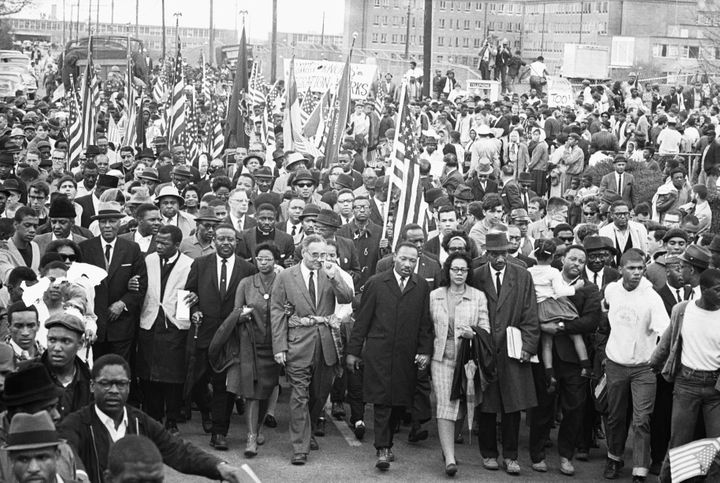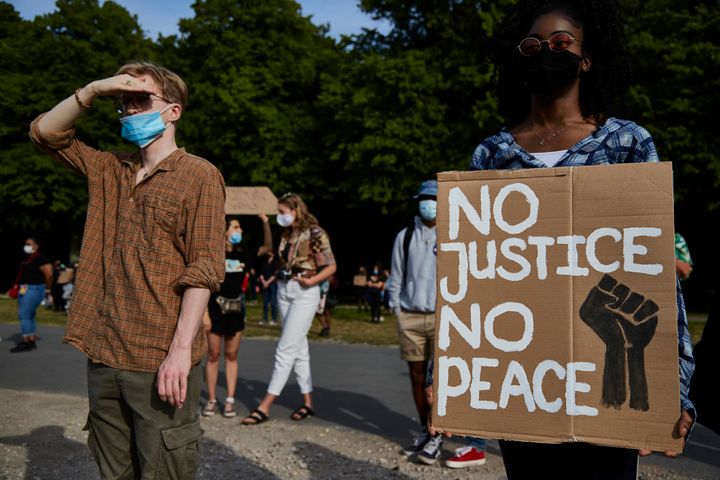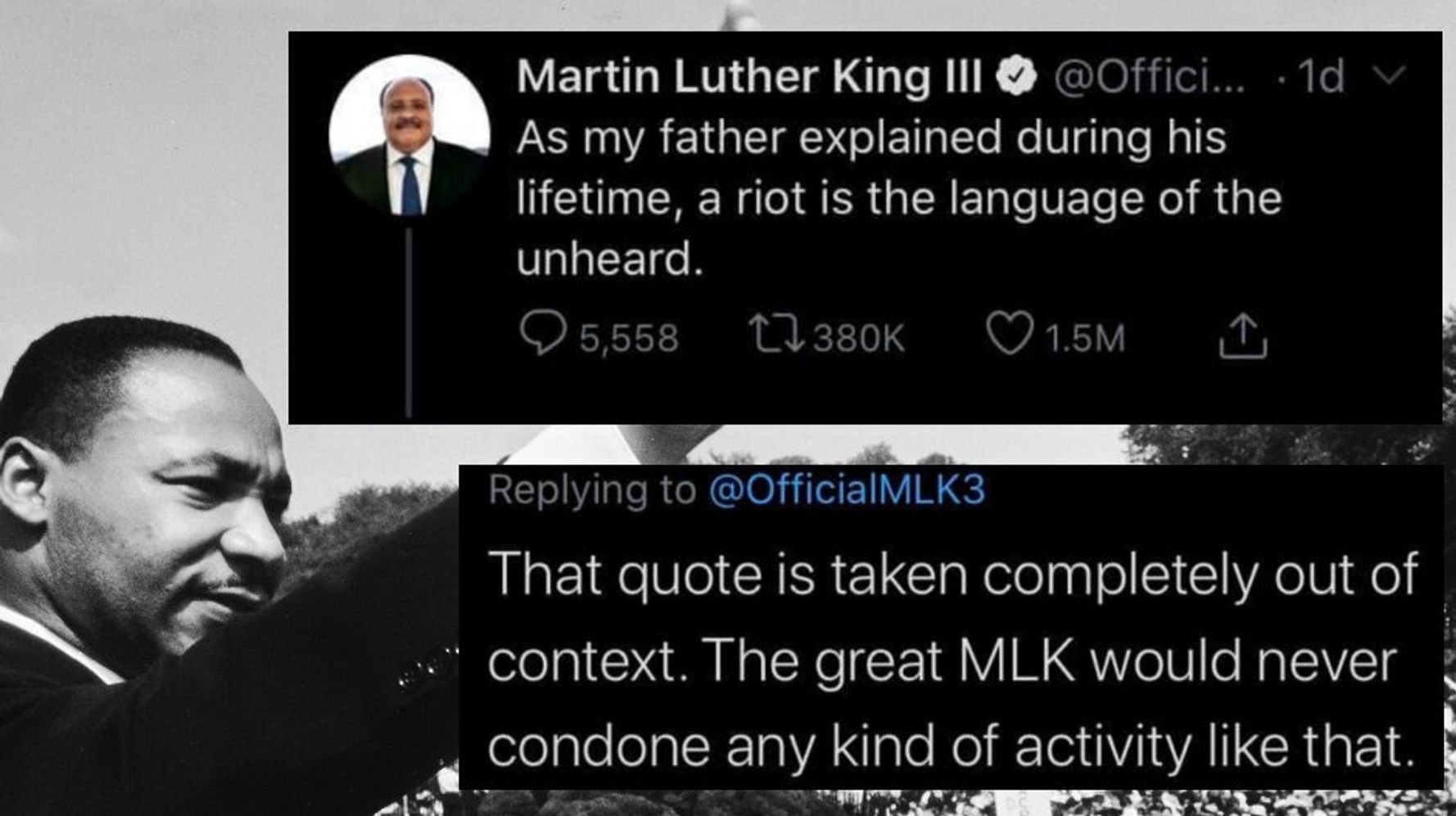[ad_1]
Last Thursday, Martin Luther King III responded to the increasingly heated protests spurred by the death of George Floyd at the hands of Minneapolis police with a quote from his father, the Rev. Martin Luther King Jr.
“As my father explained during his lifetime, a riot is the language of the unheard,” he tweeted.
It didn’t take long for white people to jump in and to try to correct him.
“He acknowledged that, but that’s not how he acted and that’s certainly not how he succeeded,” one man said.
“Your father was a brilliant man, but he wouldn’t condone the riots. He thought there was a better way to deal with the issues…” another argued.
“This is disrespectful to the ideas that your father lived for,” one person told King.
Reading the Twitter thread the next day, Evetty Satterfield, a Knox County, Tennessee school board member and a Black woman, was stunned.
“Being so filled with privilege you feel 100% comfortable with correcting MLK III is the epitome of white audacity,” she told HuffPost. “I cannot even fathom that kind of privilege.”
“Our history is whitewashed,” she added. “MLK was one of the most hated men in America and was assassinated. Period.”
Over the weekend, she shared her disbelief in a post that many on Facebook shared.
″[White people] were taught one Black history lesson and know more than what MLK children experienced first hand,” she wrote.
What Satterfield saw is nothing new: In times of great political strife, people reach for the civil rights leader’s words for consolation, solace, and as a balm to widespread societal pain.
But they also use them to quiet minority voices pushing for change. Just last January, King’s aforementioned son took umbrage at Vice President Mike Pence’s use of the slain icon’s words to make the case for a wall along the U.S.-Mexico border. (“Martin Luther King Jr. was a bridge builder, not a wall builder,” the younger King said.)
In the wake of protests following Floyd’s death, the misuse of MLK’s words has reached a fever pitch.
The White House is still using them. President Donald Trump’s press secretary, Kayleigh McEnany, on Monday played a video of “police protecting protesters and protesters embracing police” before ending the press briefing with a King quote. (It’s “beautiful to watch,” she said of the clip).
On Instagram and Facebook, a meme frequently shared by those seeking to depreciate the current protests juxtaposes a photo of King walking arm-in-arm with other civil rights leaders during the 1965 Selma-to-Montgomery marches in Alabama with a photo of someone smashing a car window.
“This is a protest,” the overlaid text declares, “This is a riot.”
Seeing that split-screen image over the weekend, musician Kennedy Rice was moved to share a split-screen of his own. It juxtaposed a similar image of King marching with a photo taken during “Bloody Sunday,” a shocking moment during those Alabama marches when state troopers knocked protesters to the ground, beat them with nightsticks and unleashed dogs on them.
“There is clearly no ‘right way’ to protest,’ Rice, who performs under the name Anywhere Welcomes You, said in his post. “The oppressor doesn’t get to dictate how we get our voices heard.”
Rice told HuffPost that those who use King’s message as a way to quell the current wave of protests “don’t know much” about King “at all.”
“That or they have only been exposed to the sterilized version of his mission, words and methods,” he said. King, “by the admission of his own daughter, Bernice King, was ‘One of the most hated men in America’ during his lifetime.’”
Though it’s not comparable with the intense animosity King generated in his time, Rice said he looks at the attacks directed at ex-NFL quarterback Colin Kaepernick for taking a knee during the National Anthem to protest police brutality and wonders: What kind of protest would be amenable to a certain segment of white America?

King preached a message of non-violence but he, like many other protesters of the era, employed tactics that Black Lives Matters protesters are heavily criticized for today: blocking roadways, for instance. King led the march that occupied the full width of the Edmund Pettus Bridge in Selma.
“For the people using Dr. King’s words against this movement, I’d tell them to educate themselves on Dr. King’s life, and not just the pretty ‘feel good’ bits,” Rice said.
The less “feel good bits” for white Americans uncomfortable with this current wave of protests include King’s letter from a Birmingham jail. At one point, he revealed his disenchantment with white moderates:
First, I must confess that over the past few years I have been gravely disappointed with the white moderate. I have almost reached the regrettable conclusion that the Negro’s great stumbling block in his stride toward freedom is not the White Citizen’s Counciler or the Ku Klux Klanner, but the white moderate, who is more devoted to “order” than to justice; who prefers a negative peace which is the absence of tension to a positive peace which is the presence of justice; who constantly says: ‘I agree with you in the goal you seek, but I cannot agree with your methods of direct action’; who paternalistically believes he can set the timetable for another man’s freedom; who lives by a mythical concept of time and who constantly advises the Negro to wait for a ‘more convenient season.’ Shallow understanding from people of good will is more frustrating than absolute misunderstanding from people of ill will. Lukewarm acceptance is much more bewildering than outright rejection.
King peacefully protested, yes, but he also pointed his finger at the white majority and asked them to take up the fight, not discourage it.
“Plus,” Rice added, “Despite his peaceful methods, he understood riots and unrest, famously stating that ‘a riot is the language of the unheard’ in his 1967 speech at Stanford University. It’s sadly still relevant today.”
LaNeysha Campbell, a podcaster and entertainment writer, said she hopes those who post King quotes promoting peaceful demonstrations ask themselves where they would have stood in relation to him in 1965.
“The reality is, what Dr. King believed in ― non-violence and peaceful protesting ― was also considered to be radical at the time,” she said. “I think some who post his quotes are sugarcoating and misrepresenting the true intention of Dr. King’s message to silence protesters who they deem are being ‘too radical.’”
Indeed, as many have mentioned, though he wasn’t perceived as nearly as radical as Malcolm X, King was still loathed by the powers that be and the majority of Americans in the 1960s. At the time of his death in 1968, nearly a third of Americans said he brought his assassination onto himself.
You should be saying, ‘Damn, why are you all still having to fight for anything 60 years after that?’ Of course you should be angry.
Azie Dungey, a writer for “Unbreakable Kimmy Schmidt” and creator of the web series “Ask A Slave”
Azie Dungey, a writer for “Unbreakable Kimmy Schmidt” and creator of the web series “Ask A Slave,” said for most people, a deeper dive into the history of King and times he lived in is called for. The curriculum most U.S. students are taught for one month every year ― February, Black History Month ― isn’t going to cut it.
The civil rights movement occurred only a few decades after “Red Summer,” she noted, a period during which race riots targeting Blacks exploded in a number of cities in both the North and South. White terrorism across the country, including riots and lynchings, was widespread.
In Chicago in 1919, for instance, white mobs attacked and set fire to the Black community over a seven-day period, leaving an estimated 1,000 Blacks homeless. The majority of the 38 people reported killed were Blacks. The New York Times reported that in some cases, white officers rode with white gangs to shield them from arrest. Other officers failed to collect evidence from the scene, to protect the white assailants.
In 1921, white mobs over a two-day period rampaged through Black neighborhoods in Tulsa, Oklahoma, devastating what was then one of the most affluent Black communities in the country. Reports at the time put the death toll at 39; a 2001 state commission said it could have been as high as 300 ― with again, Blacks being the majority of those killed.
By the time King raised his voice to challenge systematic racism, he understood “that if we gave the white majority even the tiniest reason to attack us, especially in the South where the Klan was your employer, your white neighbor, the judge, jury and police, we would not live through the level of retaliation they would be able to inflict on us without impunity,” Dungey said.

King’s fight was different from the one being fought in 2020, she added. He and his peers were fighting to integrate white spaces. Nonviolent resistance was a highly strategic move. Knowing what he knew of U.S. history, he knew there would be backlash to his protest movements. (Richard Nixon, highly strategic in his own right, went on to ride such backlashes to both the civil rights movement and anti-Vietnam protests to his 1968 presidential victory.)
In the ’60s, “we wore our Sunday best, held hands, sang Christian songs, and did not fight back also because we were still proving we were as human as a white person,” Dungey said. “We should never have had to prove that. But again, this was a strategy.”
That’s still the strategy, by and large. Most in today’s civil rights movement have assembled peacefully to stand against police violence ― after Trayvon Martin, after Eric Garner, after Tamir Rice.
But given the regularity of these deaths, many Black Americans have found it increasingly frustrating to have their protests fall on deaf ears. And to have a white person post a choice quote to tone-police Black protesters feels like an intense form of gaslighting, Dungey said.
If you’re largely unaffected by police violence, what’s happening now may feel like a “niche political issue.” For Black Americans, this is their lives.
“Look at photos of Black people being beaten, hosed, and bitten by dogs in the 1960s” during their marches. “How can you tell people now, ‘Yeah, do what they did!’ right now?” Dungey said. “You should be saying, “Damn, why are you all still having to fight for anything 60 years after that? Of course you should be angry.”
Calling all HuffPost superfans!
Sign up for membership to become a founding member and help shape HuffPost’s next chapter
[ad_2]
Source link

